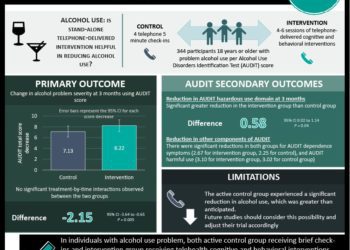Interventions for sexual and gender minority youth improve mental health and substance use
1. A systematic review found multiple studies examining the effectiveness of various behavioral, psychological, educational, pharmacologic, medical, and policy interventions on sexual and gender minority youth, all of which significantly improved mental health outcomes.
2. Some interventions studied were associated with reduced substance use and bullying victimization among sexual and gender minority youth; however, most of the studies included received weak quality of evidence ratings.
Evidence Rating Level: 2 (Good)
Study Rundown: Previous studies have shown that sexual and gender minority youth are at elevated risk for lifetime substance use, mental health problems, and violence victimization compared to cisgender and heterosexual youth. Various interventions have attempted to curtail this disparity, but there is limited knowledge of the efficacy of such interventions among sexual and gender minority youth. In this systematic review, researchers identified 9 studies of interest that reported effectiveness of 11 behavioral, psychological, educational, pharmacologic, medical, and policy interventions among participants identified as sexual or gender minorities who were aged <18 years. All examined interventions significantly improved mental health outcomes, and some were associated with reduced substance use and bullying victimization. Most of the studies included received weak global quality of evidence ratings due to low or unreported participation rates, strong selection bias, failure to control for potential confounders, and/or high attrition rates.
The study was limited by its exclusion of non-English studies, and the review did not examine interventions discussed outside of peer-reviewed scientific publications. Nonetheless, the study is strengthened by its large, representative sample of literature examining multiple outcomes. For physicians, these findings highlight the potential for addressing mental health, substance use, and victimization among sexual and gender minority youth through implementation of evidence-based interventions.
Click to read the study, published today in Pediatrics
Relevant reading: The Association Between Health Risk Behaviors and Sexual Orientation Among a School-based Sample of Adolescents
In-Depth [systematic review]: Researchers used publication databases to identify 6598 records of randomized and nonrandomized studies published from January 2000 to 2019 that examined the effectiveness of behavioral, psychological, educational, pharmacologic, medical and policy interventions on substance use, mental health, and violence victimization among participants identified as sexual or gender minorities who were aged <18 years. A total of 9 studies met all of the inclusion criteria and these studies included 9 interventions for mental health, 2 for substance use, and 1 for violence victimization. The included studies had 1 050 339 participants with an average age of 15.95 years.
The included studies had 1 intervention focused on sexual and gender minority youth; participants were provided 1 year of coordinated community-based mental health services, and were found to have significantly decreased severity of mental health symptoms and substance use on follow-up. Interventions focusing on sexual minority youth included state policy interventions, a therapist-administered family-based intervention, a computer-based intervention, and an online intervention. The interventions focusing on gender minority youth were transition-related gender-affirming care interventions. All examined interventions significantly improved mental health outcomes; furthermore, an online intervention aimed at reducing substance use was successful in reducing substance use, and enactment of state-level anti-bullying laws that enumerated sexual orientation as a protected class reduced bullying victimization. Most studies received weak global quality of evidence ratings, 1 received a moderate rating, and 1 received a strong rating in accordance with the Quality Assessment Tool for Quantitative Studies checklist.
Image: PD
©2019 2 Minute Medicine, Inc. All rights reserved. No works may be reproduced without expressed written consent from 2 Minute Medicine, Inc. Inquire about licensing here. No article should be construed as medical advice and is not intended as such by the authors or by 2 Minute Medicine, Inc.









